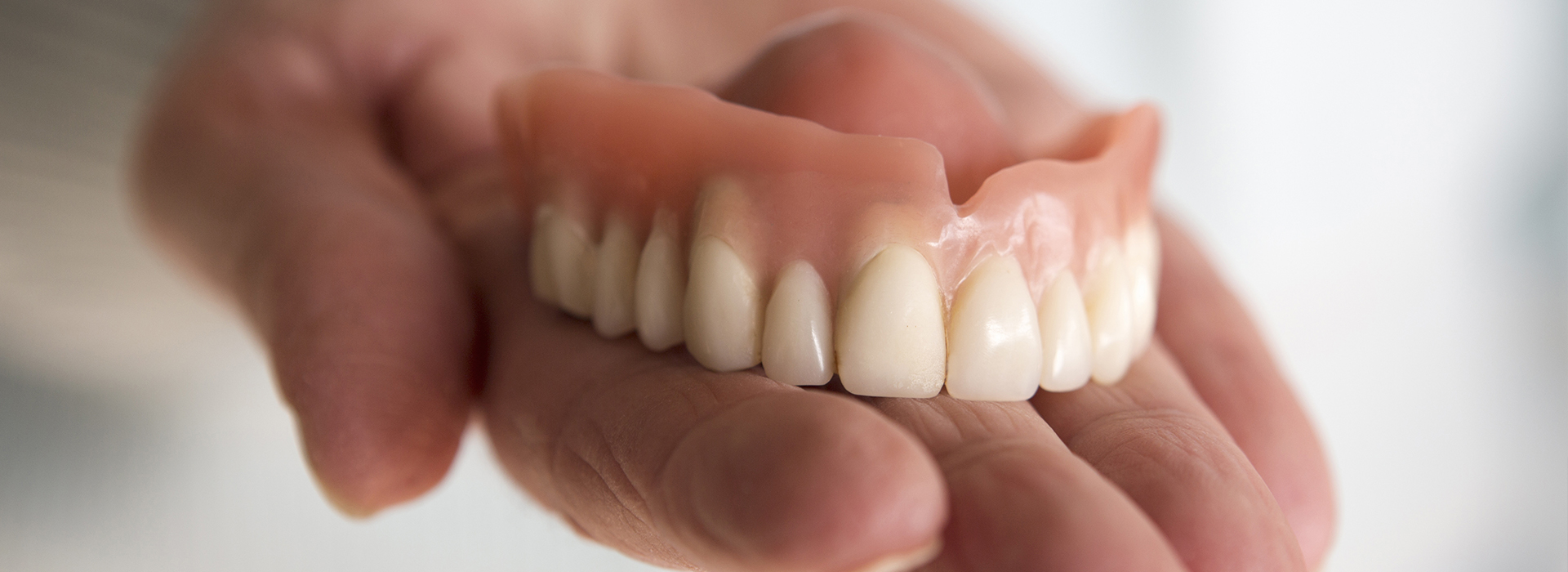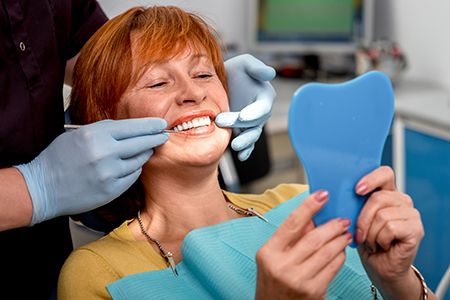Contact Us
Schedule your appointment online or give us a call to get started today.

Advances in dental materials and techniques have made replacing missing teeth more natural-looking and comfortable than ever. Removable dentures remain a reliable option for many people who want to restore function and appearance when fixed solutions are not appropriate or not desired. Well-made dentures can recreate a balanced smile, support facial contours, and help you speak and eat with greater confidence.
At Black Mountain Family Dentistry, we approach denture care with the same attention to detail and modern methods we apply to all our restorative services. That means careful diagnosis, thoughtful design, and individualized fitting so each prosthesis supports the patient’s oral health, appearance, and daily needs.
This page explains how tooth loss affects oral health, the different denture options available, the steps involved in planning and fabrication, and what you can expect as you adapt to a new prosthesis. Our goal is to give clear, practical information so you can make informed decisions about restoring your smile.
Losing one or more teeth is about more than the visual gap in your smile. Missing teeth alter how your bite distributes force, which can strain remaining teeth and the jaw joint over time. When chewing patterns change, it can affect nutrition and the enjoyment of foods you once took for granted.
Tooth loss also affects the soft tissues and bone that support the face. Without tooth roots and the stimulation they provide, jawbone tends to remodel and shrink. That process can subtly change facial contours and make the lower face look shorter or more collapsed, especially when multiple teeth are missing.
Addressing tooth loss sooner rather than later can preserve function and slow secondary changes to the bite and facial appearance. Dentures—whether partial or complete—offer a proven way to restore chewing ability and help maintain a balanced facial profile while other restorative options are considered.

Dentures are removable prostheses that replace missing teeth and the surrounding gum tissue. They are built from durable materials to mimic the color, shape, and arrangement of natural teeth and sit on the soft tissues of the jaw. A well-designed denture restores appearance and function while remaining comfortable to wear.
Unlike fixed bridges or implant-supported restorations, removable dentures can be taken out for cleaning and overnight rest. This accessibility makes it easier to maintain the health of the gums and any remaining natural teeth, and it allows for adjustments over time as the mouth changes.
Contemporary denture design balances esthetics and function. Careful attention to tooth selection, bite relationships, and the contours of the supporting base helps produce a prosthesis that looks natural and performs well during speech and chewing.
Choosing the appropriate denture design starts with a thorough clinical evaluation. We review the number and condition of remaining teeth, the volume of supporting bone, the health of the gums, and your goals for appearance and daily function. These factors guide whether a partial or complete denture is the best solution.
Partial dentures replace several missing teeth while preserving healthy natural teeth. They typically anchor to adjacent teeth using clasps or precision attachments, re-establishing the dental arch and preventing unwanted movement of remaining teeth.
Complete dentures replace all teeth in an upper or lower jaw. They rely on the shape of the mouth, suction, and tissue contact for retention, and in some cases can be enhanced with attachments or implants to improve stability and comfort.
Complete dentures can be delivered in different ways depending on clinical needs. A conventional complete denture is made after the gums have healed following extractions, which can result in a precise long-term fit once healing is complete. In contrast, there are solutions that allow patients to leave the office with teeth immediately after extractions when immediate aesthetics and function are a priority.
An immediate denture is fabricated in advance and placed the same day remaining teeth are removed. This approach avoids a period of edentulism (being without teeth) while tissues heal. Because the mouth changes during healing, an immediate denture may need relining or adjustment as the gums and bone remodel.
Overdenture
An overdenture gains extra support from retained natural tooth roots or attachments to existing teeth. Preserving roots when possible helps maintain bone and improves the stability of the prosthesis.
Implant-Supported Dentures
Implant attachments provide fixed points of retention that greatly reduce movement of the denture. This option is especially helpful for lower dentures, which can be less stable on their own due to anatomy and tongue movement.
Partial dentures come in a range of materials and frameworks, each offering different balances of strength, flexibility, and esthetics. Traditional cast-metal frameworks are durable and thin, while flexible resin options prioritize comfort and a low-profile fit. Hybrid designs combine strengths of multiple materials.
Design choices are guided by the number of missing teeth, the condition of supporting teeth, and how the prosthesis will be used. A thoughtful plan aims to restore chewing function, resist food trapping, and integrate smoothly with the remaining dentition.

Crafting a successful denture blends clinical science with precise laboratory work. The process begins with a comprehensive exam that includes a review of your medical history, a careful inspection of remaining teeth and tissues, and diagnostic imaging when needed to evaluate bone and supporting structures.
Records and impressions taken at early visits allow the dental team to assess how the jaws come together and to plan tooth position and bite relationships. Trial fittings—where the teeth and base are evaluated before final processing—ensure esthetics, phonetics, and bite are all satisfactory before the denture is finished.
When extractions or pre-prosthetic surgery are necessary, timing and technique are coordinated so the final outcome supports comfort and long-term stability. In cases where implants are used to support a denture, surgical and restorative steps are integrated into a staged treatment plan.
Every step, from impression taking to final polishing, is performed with an eye toward minimizing sore spots, optimizing retention, and producing a prosthesis that patients find both functional and pleasing in appearance.

Adapting to a new denture takes time and patience. Early experiences may include increased saliva, minor speech changes, and sensitivity in areas of the gums. Most patients find these issues diminish within days to weeks as the mouth adjusts and minor adjustments are made during follow-up visits.
Eating with a new denture is best approached gradually: start with soft foods cut into small pieces and chew evenly on both sides. Over time, most people regain the ability to enjoy a wider variety of foods as coordination and comfort improve.
Proper cleaning and nightly rest are essential for the longevity of any removable prosthesis. Rinse dentures after meals, brush them with a denture brush or soft brush to remove debris, and soak them overnight in water or a recommended cleanser. Also maintain the health of any remaining natural teeth and gums by brushing and gently cleaning the mouth daily.
When to seek follow-up care
Regular dental checkups let us monitor fit, check the health of oral tissues, and address changes that develop over time. If you notice sore spots, persistent looseness, or changes in bite, schedule an evaluation so adjustments or relines can be made.
Relines and long-term maintenance
As the mouth naturally changes, relining a denture restores intimate contact with the tissues and improves comfort. Periodic maintenance helps preserve fit and function and can extend the useful life of the prosthesis.
At Black Mountain Family Dentistry we aim to help patients regain comfort, confidence, and practical function with thoughtfully designed dentures. If you would like more information about options for replacing missing teeth or the steps involved in denture care, please contact us for additional details.
Today, it’s easier than ever to replace missing teeth and achieve natural-looking, durable, and long-lasting results! Depending on a patient’s dental needs, lifestyle, expectations of care, and budget, choices can include conventional fixed bridgework, dental implants, or removable partial and complete dentures. At the office of Black Mountain Family Dentistry, we’ll discuss all your options in care and answer all your questions as you choose the solution that’s right for you.
With advances in dental materials and technology, today’s dentures are more comfortable and realistic-looking than ever before.
Whether you wear partial or complete dentures, it’s essential to see the dentist for routine care. Besides checking the fit and condition of your dentures and making any necessary adjustments, you’ll also receive a comprehensive exam to check on the health of any remaining teeth as well as the soft and hard tissues in and around the oral cavity.
A same-day denture offers an accelerated design and fabrication process that allows a patient to go from impression taking to denture insertion in a single day.
For patients who don’t want to wait after having teeth extracted, an immediate denture can be inserted the same day your teeth are removed. Sometime later you may need the denture relined to address any changes in its fit once the extraction sites have completely healed.
While no one wants to drop or break a partial or complete denture, accidents do happen. The good news is that in some cases, your partial or complete denture is reparable. It all depends on the extent of the damage. Don’t hesitate to contact our office if you’ve broken or damaged your denture. We’re happy to help.
The simple act of taking your partial denture in and out can cause certain types of metal clasps to loosen over time. When you come in for your checkup visit or contact our office for an adjustment, we’ll assess the fit of your partial and tighten the clasps for improved stability and comfort.
While rebuilding a complete smile is a worthwhile investment, our office is sensitive to the costs involved in dental care. We customize care and will discuss which treatment options address your needs, lifestyle, and budget. How much a new denture will cost depends on the type of the prosthesis, its design, and the materials used to fabricate the supportive base, teeth, and clasps or precision attachments. Dentures that include the placement of dental implants for added retention and stability typically involve additional costs.
If you have dental insurance, your coverage may include a new or replacement set of dentures. Our staff is happy to review your coverage with you to ensure you are maximizing your insurance benefits while minimizing any out of pocket expenses.
At the office of Black Mountain Family Dentistry, we provide an extensive range of dental services, including the latest and most effective methods to help patients with missing teeth rebuild complete and beautiful smiles. As skilled and experienced professionals, we recognize that every patient is different, and every smile is unique. We’re passionate about what we do and take great pride in providing personalized treatment plans while treating our patients as valued partners in care.
Schedule your appointment online or give us a call to get started today.
